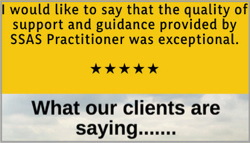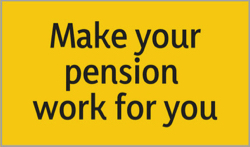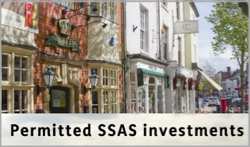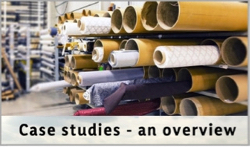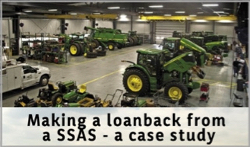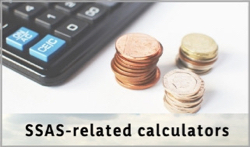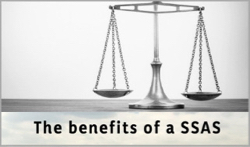SSAS as a business tool
Could a SSAS loanback help grow your business?
A SSAS can be used to loan money to your company or a third party.
Why pay the bank interest when you can use it to help fund your retirement? A SSAS loanback is the only form of business funding where the interest on the finance provided to your company is repaid to your pension for funding your retirement.
If you need to raise finance for your company, why not bypass the bank and borrow money tax efficiently from your pension scheme? Remember, growth and income in the SSAS remain tax free.
Example:
| The value of your SSAS | £500,000 |
| Maximum loanback (50%) | £250,000 |
£250,000 is lent to your company from cash in your SSAS to fund, for example, purchase of machinery. The loan term is five years (maximum term); capital and interest are payable monthly. With an interest rate of, for example, 6.5% pa, the interest payable over five years is £30,026. Your SSAS pockets this interest rather than your bank, thus benefitting your retirement rather than increasing the bank's profits.
What would my loanback repayments be? Please email us at info@ssaspractitioner.com for a loan repayment quote.
Rules governing loanbacks from a SSAS
Loans need to be repaid on a capital and interest basis, and need to be secured by a first charge on an asset of sufficient value to cover capital and interest outstanding over the duration of the loan.
Maximum loan is 50% of the scheme value.
Loans can be made to the scheme's Sponsoring Employer.
Loans must be set up via a loan agreement (we arrange this) and must be on commercial terms.
The rate of interest must be 1% above the average of the base lending rates of the following six leading high street banks specified in the regulations:
The Bank of Scotland plc
Barclays Bank plc
HSBC Bank plc
Lloyds Bank plc
National Westminster Bank plc
The Royal Bank of Scotland plc
The average rate calculated should be rounded up as necessary to the nearest multiple of 0.25%.
The loan must be for a purpose that matches the nature of your company business. Please let us know what you require the funds for. A SSAS is permitted to lend money to a third party. In this case, none of the restrictions listed above apply.
Loanbacks and their tax-efficient benefits to your company
If purchases of capital equipment are to be funded by the company, making the purchase via a loanback from the SSAS may be advantageous. Contributing to the SSAS, then lending funds back to the company, may very well result in a reduction in your tax liability and create a tax-deductable, ongoing expenditure (the loanback) to offset against future profits.
Contributions to the SSAS attract corporation tax relief. These monies, once in the SSAS, can be loaned for the purchase of capital equipment. Repayments of the SSAS loan by the company are tax deductable, making a loanback a highly tax-efficient way of funding purchases within the company. Remember, we charge only £1,895 + VAT pa for running your scheme, fully inclusive, with no additional charges! Most providers charge extra for setting up loanbacks; not SSAS Practitioner.com. You may, however, need to pay a solicitor to secure the charge against the loan.
Once we have set up your scheme we can arrange to transfer your existing policies into the scheme. You can lend up to 50% of the scheme's value straight away, including these policies.
Borrowing by your SSAS to purchase commercial property
A SSAS can borrow 50% of its value to fund the purchase and development of commercial property and land. These borrowings would usually come from a bank, at a rate as favourable as possible to the SSAS. Banks usually take the SSAS-owned property as security and demand capital and interest payments, funded by rental income the SSAS receives.
Example:
| The value of your SSAS | £500,000 |
| Maximum Borrowing | £250,000 |
The maximum amount available to purchase commercial property would therefore be £750,000 (this includes VAT, if applicable, stamp duty and solicitor's fees to be paid by the scheme).
If, for example, your company's commercial premises are purchased by your SSAS for £750,000 the property becomes an asset of the scheme, thus providing cash to your company for use elsewhere.
Future development of the property as an asset within the SSAS can be funded using SSAS contributions, which themselves attract tax relief.
Any increase in the value of the property is free from Capital Gains Tax, which would not be the case if the property was owned by your company.
Rent must be paid by the company to your SSAS; this is subject to tax relief and, if the property is mortgaged, can be used to fund the SSAS's mortgage.
Alternatively, why not purchase commercial property elsewhere and hold it as a tax-efficient scheme investment?
What would my borrowing repayments be? Please email us at info@ssaspractitioner.com for a repayment quote.
Rules governing borrowing by a SSAS
The SSAS can borrow up to 50% of its value.
The SSAS can borrow from any individual, company or financial institution whether or not they are a connected party.
The SSAS can borrow for any purpose providing the Trustees are confident the borrowing will benefit the scheme. The usual reason would be to purchase commercial property.
Any borrowing from a connected party must be on commercial terms.
Remember, we charge only £1,895 + VAT pa for running your scheme, fully inclusive with no additional charges! Most providers charge extra for setting up borrowing; not SSAS Practitioner.com!
Contributions to your SSAS attract Corporation Tax Relief on your company's profits
Your company can contribute to the SSAS. Tax relief will be granted provided the contributions are ‘wholly and exclusively for the purposes of the business’ and providing the contributions do not exceed the annual allowance.
Personal contributions can also be made, and these attract tax relief at your highest rate of income tax up to the annual allowance.
Protect your assets from creditors
In the event of business failure, assets within your SSAS are in trust and therefore cannot be touched.
The SSAS falls outside of your estate.
Selling assets held by you or your business to your SSAS is perfectly acceptable to HMRC, and SSAS Practitioner.com can oversee this for you.
Most providers charge extra for setting up a loanback or borrowing, not SSAS Practitioner.com.
